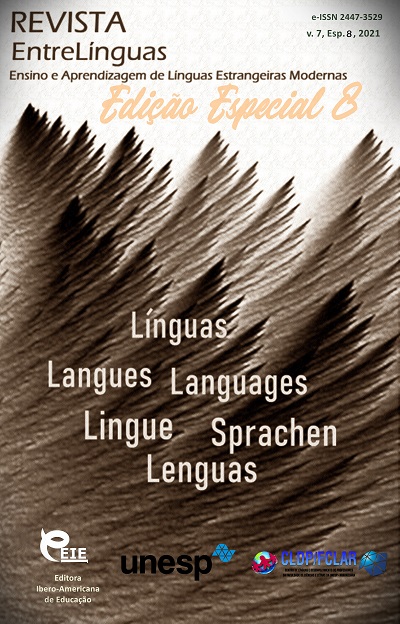Metáfora zoomórfica caracterizando um homem em um texto literário: dificuldades de tradução em línguas com diferentes estruturas (o caso do russo e do turco)
DOI:
https://doi.org/10.29051/el.v7iesp.8.16359Palavras-chave:
Metáfora, Zoomorfismo, Tradução, Semântica, Denotatum, Homem, Linguagem, Texto, MentalidadeResumo
O artigo apresenta uma análise das metáforas zoomórficas que caracterizam uma pessoa em um texto literário. O estudo pretende revelar gargalos na tradução para línguas com estruturas diferentes. O estudo parte dos princípios científicos gerais de sistematicidade, correspondência, completude, complementaridade, consistência, determinismo e verificação. Os métodos usados no artigo são o método da unidade do histórico e do lógico no conhecimento sócio-cultural, métodos comparativos e contrastivos. Com base no propósito e objetivos, análise comparativa, síntese interdisciplinar e outras técnicas de metodologia científica geral têm sido empregadas. Principais achados: o estudo de metáforas zoomórficas que caracterizam um homem em um texto literário mostra estereótipos inconscientes não só na interpretação da imagem de outro por um falante nativo da língua nacional, mas também nas especificidades de imagear o ambiente circundante, emanados da mentalidade e manifestado ao escolher certas categorias e conceitos na descrição do mundo.
Downloads
Referências
Atasözleri ve Deyimler Sözlüğü [online] Available at: https://sozluk.gov.tr/ (Accessed: April 09, 2021)
Güncel Türkçe Sözlük [online] Available at: https://sozluk.gov.tr/ (Accessed: April 09, 2021)
KOLESNIKOVA, G.I. Vagaries of Translation: Types, Factors, Influence over Interculturality. A Collection of the Reports of the International Symposium in the Context – Heydar Aliyev: the Ideology of Multiculturalism and Tolerance – “Heydar Aliyev and the Turkic World”, Dedicated to the 95th Anniversary of the Birth of the Founder of the Independent Azerbaijani State, Heydar Aliyev (April 13-14, 2018. Erzurum, Turkey). 365 p. - P.176-184. ISBN: 978-605-2278-66-6
KOLESNIKOVA, G.I., KONOVALOVA, А.V. Education System in Modern Russian Society: Problems and Solution (or “Who is to Blame?” And “What is to Be Done?”)// Humanization of Education, 2018, Issue 3. 134 p. P.9-15.
The Explanatory Dictionary of the Russian Language /edited by Ozhegov S. I., Shvedova N. Y.. [Electronic resource] Available at: http://lib.ru/DIC/OZHEGOW/ozhegow_s_q.txt (Accessed: April 09, 2021)
Türkçe Sözlük, Türk Tarih Kurumu Basım evi, Ankara, 1998.
КOLESNIKOVA, G.I. A Harmonious Man: The Strategies of Education and the Factors of Development. Intellectual Culture of Belarus: Methodological Capital of Philosophy and the Contours of Transdisciplinary Synthesis of Knowledge: Materials of the Third International Conference, November15–16, 2018, Minsk. In 3 Volumes. Vol. ІІ /
Institute of Philosophy of the National Academy of Sciences of Belarus; edited by А. А. Lazarevich
(the preface) [et al]. Minsk : Four Quarters, 2018. 362 p. P.111-114.
Downloads
Publicado
Como Citar
Edição
Seção
Licença

Este trabalho está licenciado sob uma licença Creative Commons Attribution-NonCommercial-ShareAlike 4.0 International License.
Os manuscritos aceitos e publicados são de propriedade da Revista EntreLínguas. Os artigos publicados e as referências citadas na Revista EntreLínguas são de inteira responsabilidade de seus autores.
Transferência de direitos autorais – autorização para publicação
Caso o artigo submetido seja aprovado para publicação, já fica acordado que o(s) autor(es) autoriza(m) a UNESP a reproduzi-lo e publicá-lo na EntreLínguas, entendendo-se os termos “reprodução” e “publicação” conforme definição respectivamente dos incisos VI e I do artigo 5° da Lei 9610/98. O artigo poderá ser acessado pela rede mundial de computadores (Internet), sendo permitidas, a título gratuito, a consulta e a reprodução de exemplar do artigo para uso próprio de quem a consulta, desde que haja a citação ao texto consultado. Essa autorização de publicação 328 EntreLínguas, Araraquara, v. 1, n .2, p. 323-328, jul./dez. 2015 não tem limitação de tempo, ficando a UNESP responsável pela manutenção da identificação do(s) autor(es) do artigo. Os artigos publicados e as referências citadas na Revista EntreLínguas são de inteira responsabilidade de seus autores.











